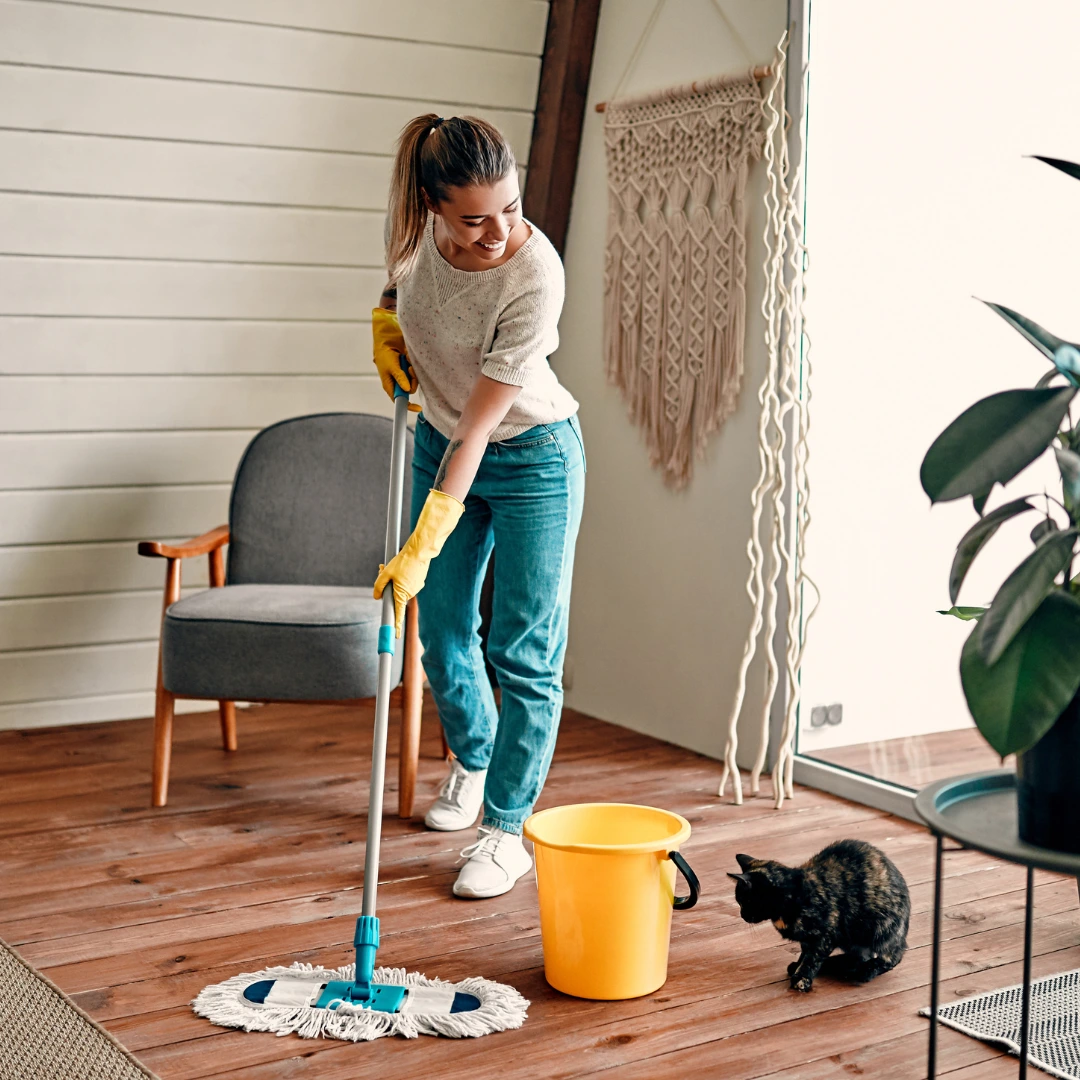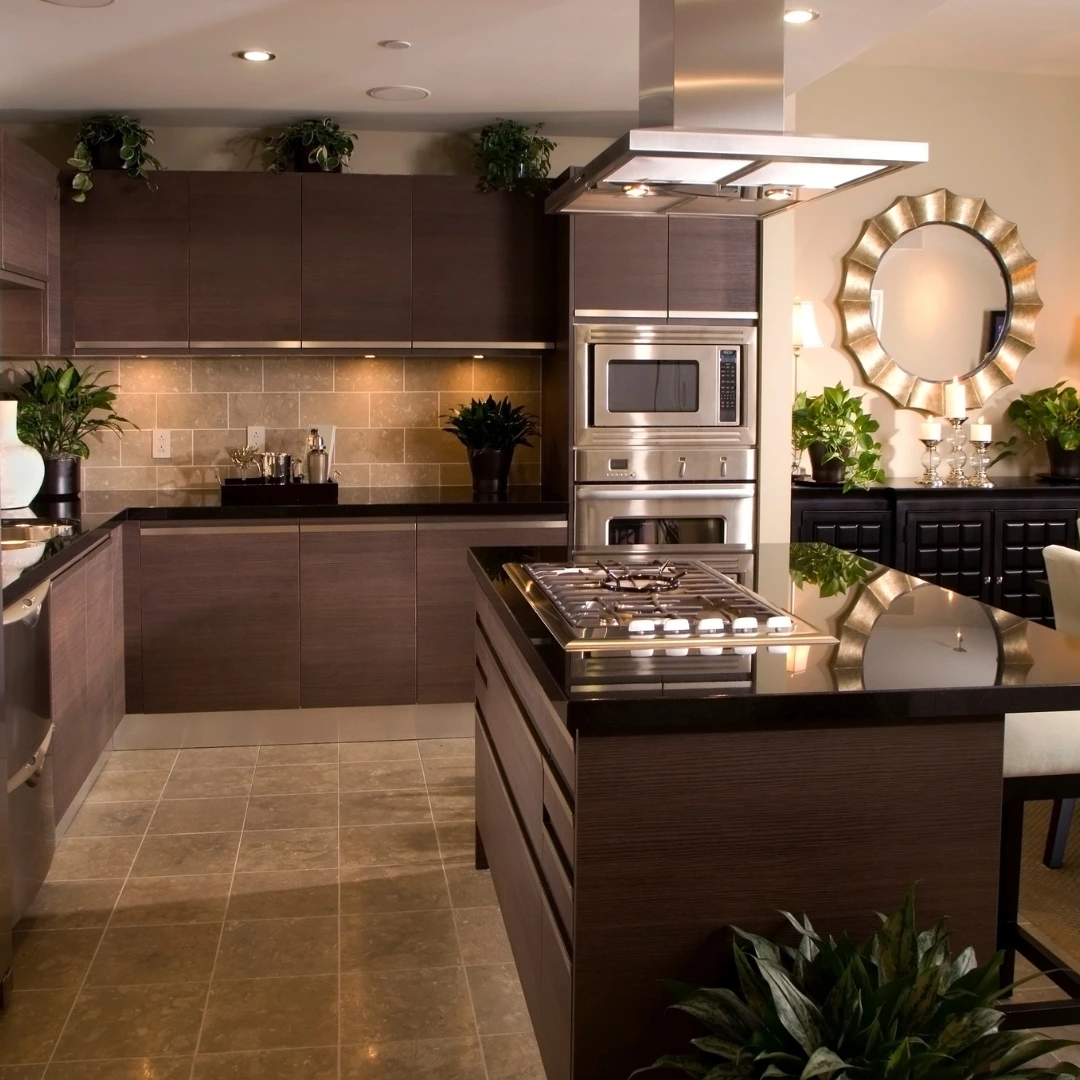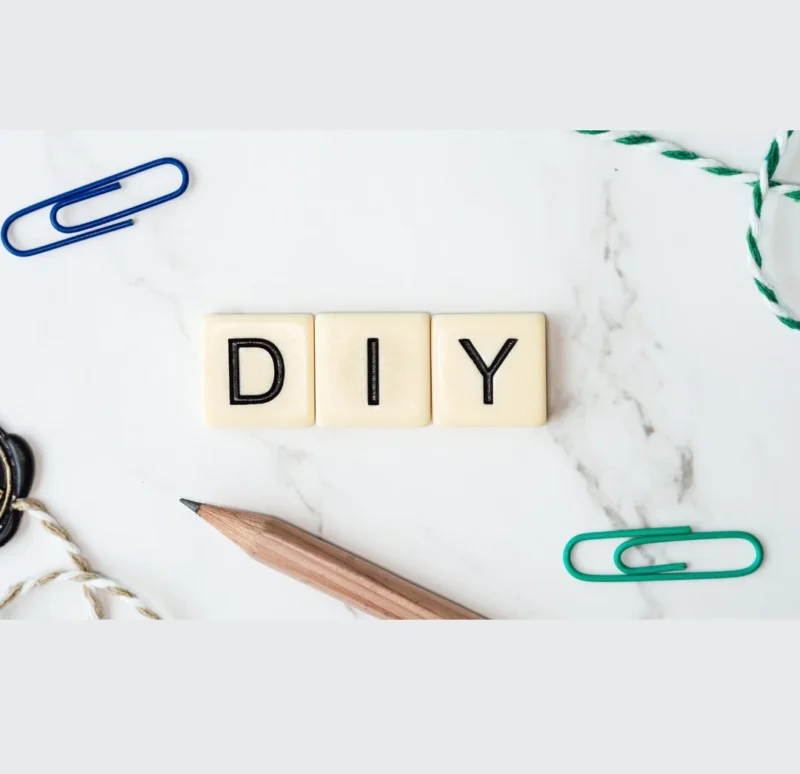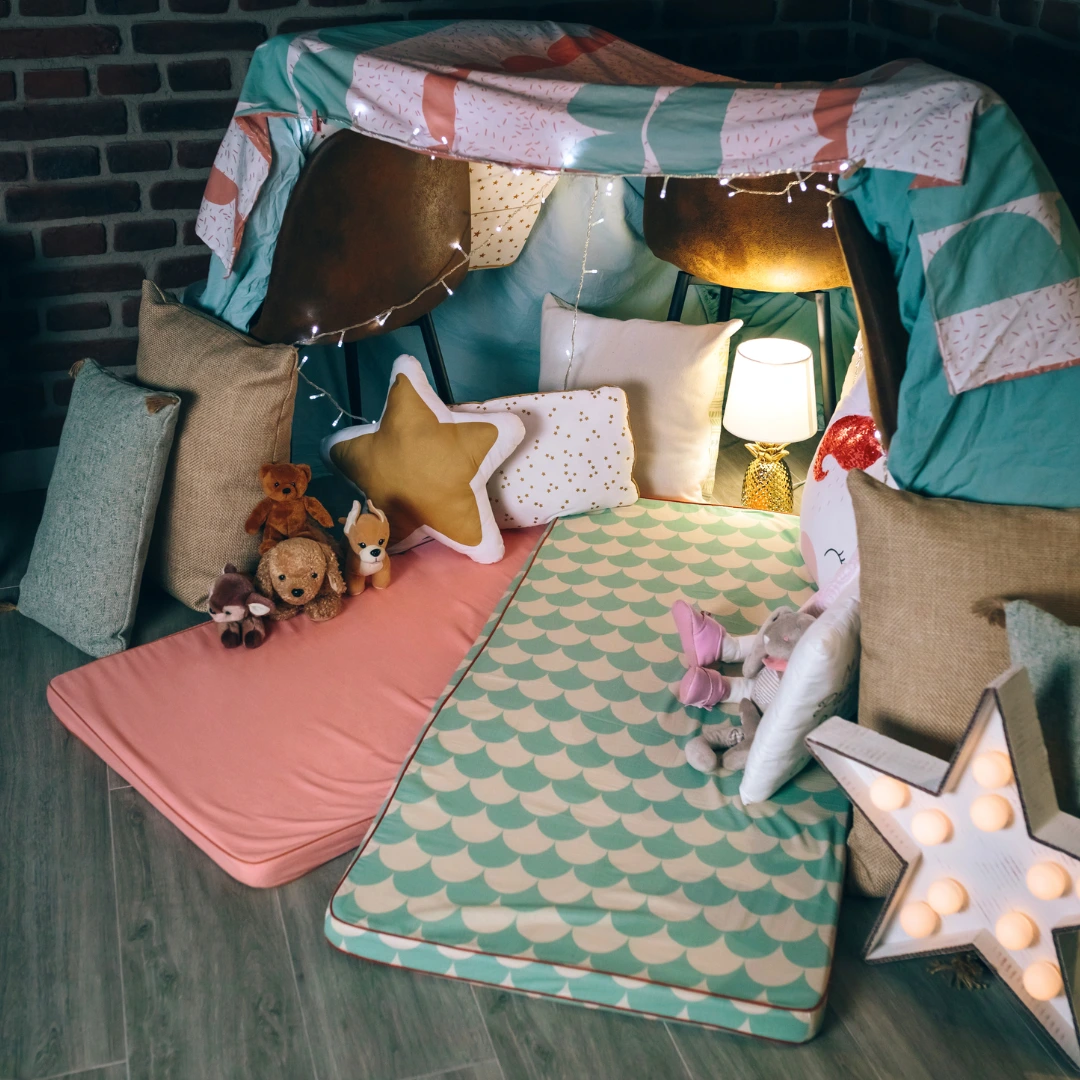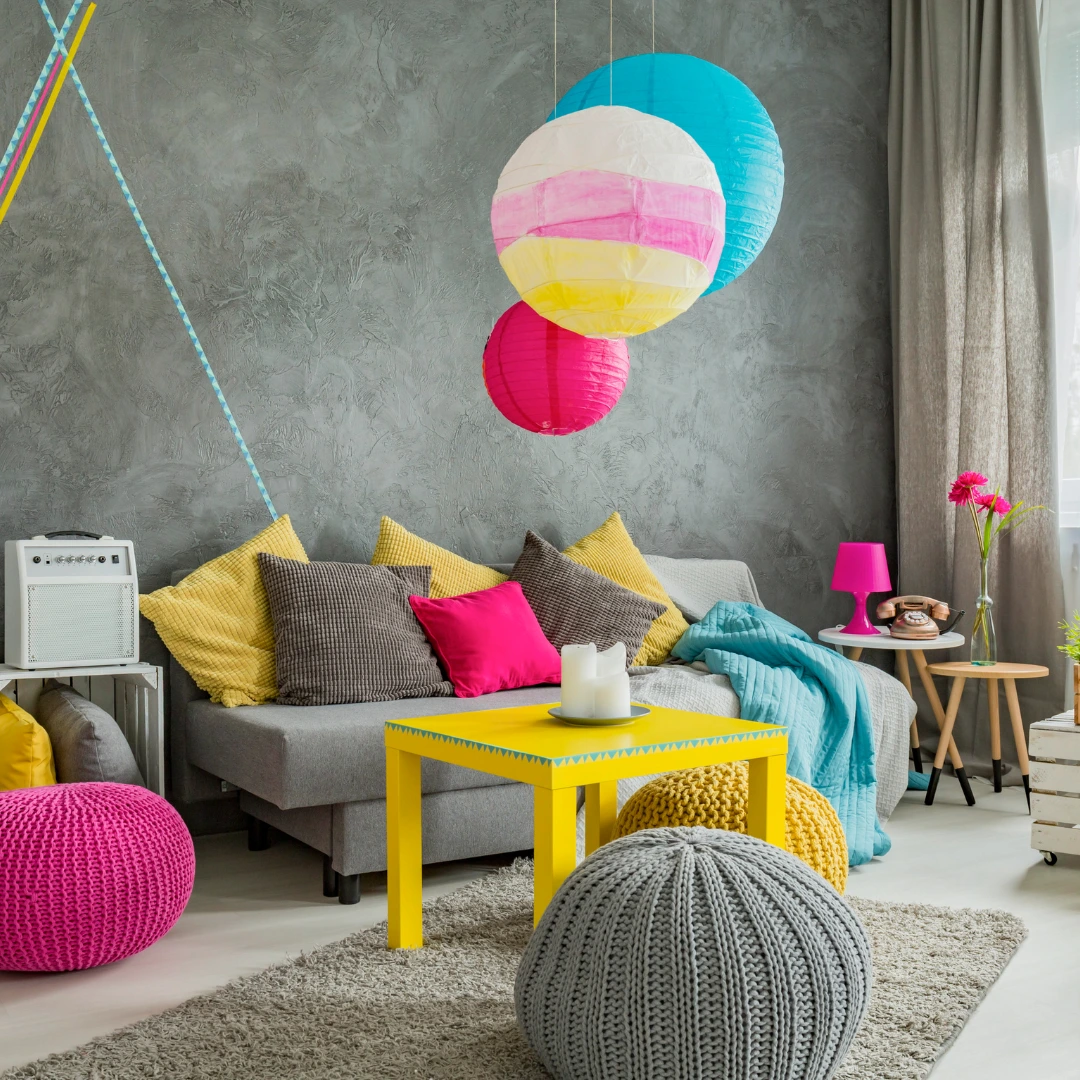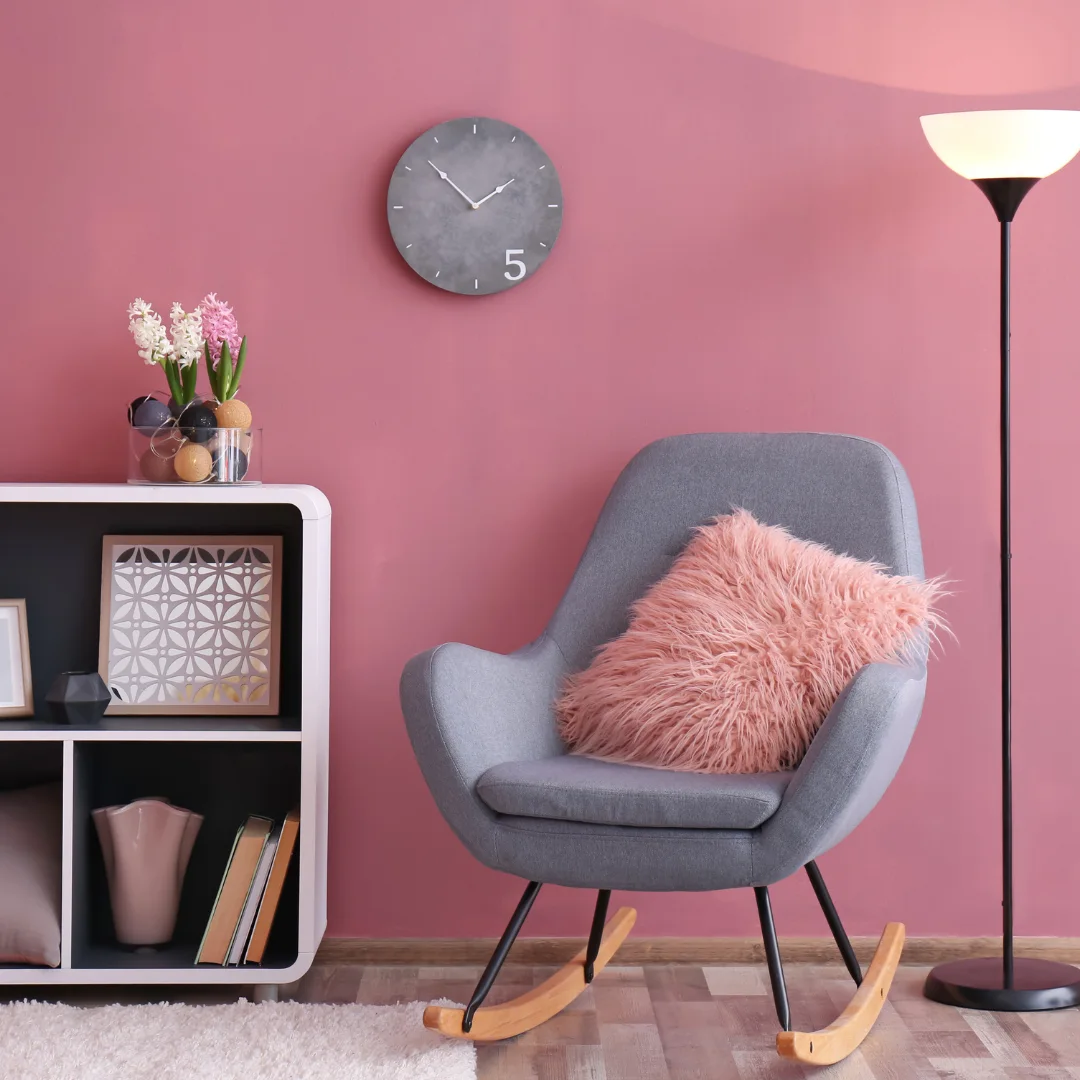Homemade Floor Cleaner: 4 Must-Try DIY Recipes Best for NYC
- by Parul Yadav
- September 24, 2025
- 0
- 414
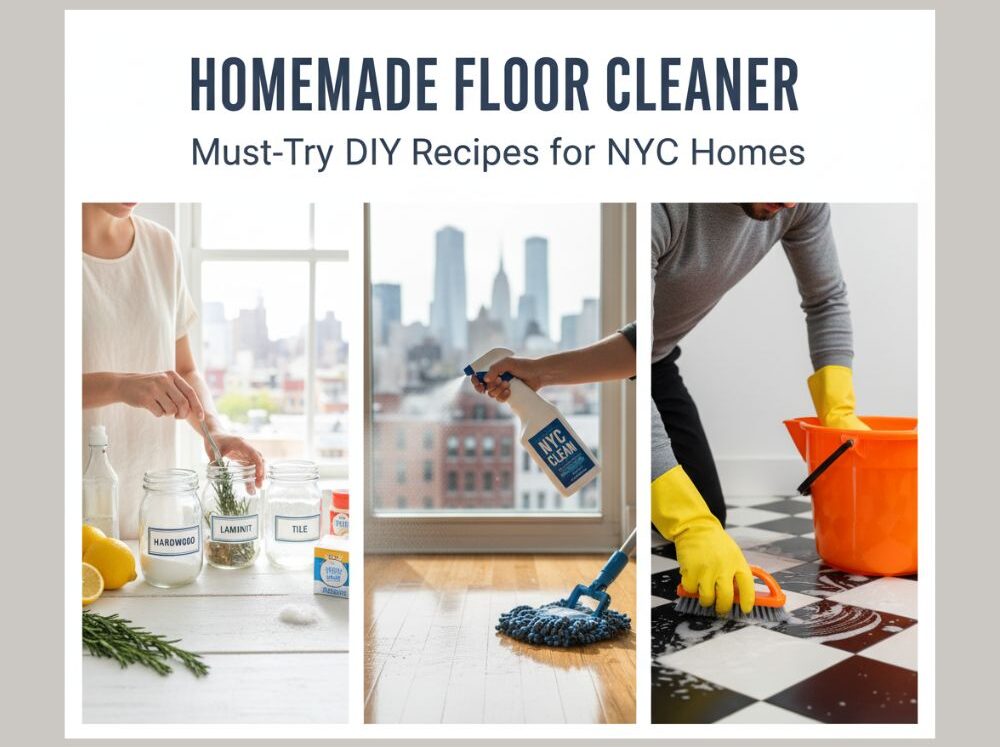
The moment I got the keys to my new apartment, the floors looked pristine. That fresh start glow was so real, until it wasn’t. A few weeks of dodging rogue crumbs, tracking in city grime, and trying to scrub out sticky mystery spots left me totally fed up. I was tired of store-bought cleaners that either left a weird, sticky residue or were filled with harsh chemicals I didn’t want my dog or myself exposed to. That’s when I decided to take matters into my own hands and create the ultimate homemade floor cleaner guide.
Did you know
Ketchup isn’t just for burgers and fries? The mild acidity from its tomatoes makes it an excellent, all-natural cleaner for polishing tarnished copper and brass pots. Just rub a thin layer on the surface, let it sit for a few minutes, then wipe it clean! Source: Vintage French Copper
I realized that a great homemade floor cleaning solution doesn’t have to be complicated. With just a few simple, natural ingredients, you can make a safe, effective, and budget-friendly DIY floor cleaner that will get your floors sparkling. This guide will help you understand the science behind homemade floor cleaner recipes and give you the confidence to tackle any mess.
Ingredients: What to Use, What to Avoid
When you start researching homemade floor cleaner recipes, you’ll find a ton of conflicting advice. As a seasoned DIYer, I’ve learned that the key to a great homemade floor cleaning solution is understanding what each ingredient does and, more importantly, what to avoid. Let me break down the essential components and debunk some common myths.
Did you know
The U.S. Environmental Protection Agency (EPA) and the Consumer Product Safety Commission (CPSC) warn that some common household cleaning products contain chemicals that can contribute to indoor air pollution. For many people, exposure to these pollutants may pose a greater health risk than outdoor air pollution, especially since people spend an average of 90% of their time indoors.
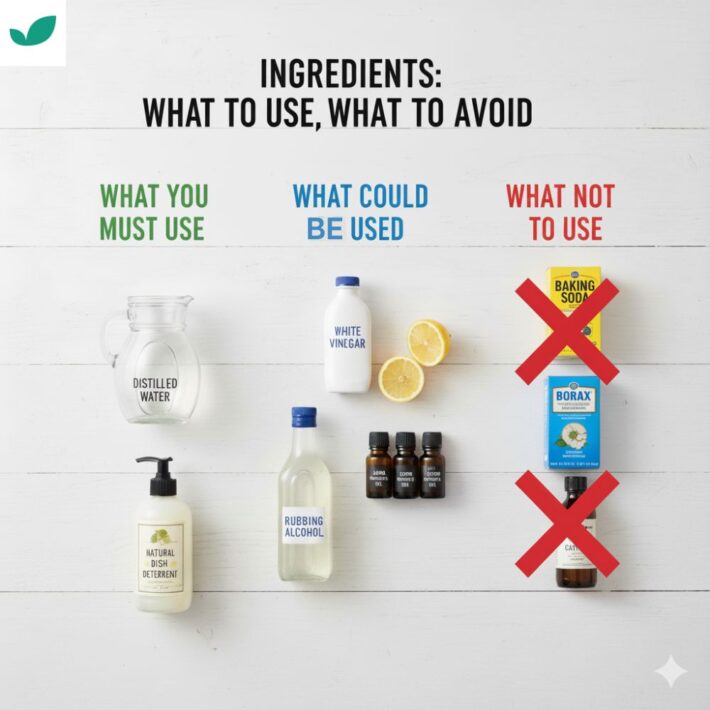
What You Must Use
- Water: Water is the fundamental ingredient in any homemade floor cleaner. For the best results, I always recommend using distilled water. This is a crucial point that helps prevent hard water minerals from leaving behind a dull film or streaks, ensuring your floors are dry and crystal-clear.
- Detergent: A gentle, natural dish detergent is an absolute must-have for any homemade floor cleaning solution. Unlike some other soaps, a mild dish detergent is specifically designed to cut through grease and grime without leaving a soapy residue, making it ideal for high-traffic areas like kitchens and entryways.
What Could Be Used
- Vinegar: Vinegar is a powerful, low-cost cleaning agent that is great for tackling tough dirt and grime. However, it’s not a universal solution. I’ve found that while some swear by vinegar and water, it can actually damage certain finishes over time and isn’t a safe option for marble. We will address this “Great Vinegar Debate” in our specific recipes.
- Rubbing Alcohol (Isopropyl Alcohol) or Vodka (Ethanol): These ingredients are my secret weapon for a truly streak-free finish. They evaporate much faster than water, which is why they are so effective. As a DIY floor cleaner enthusiast, I prefer using rubbing alcohol because it’s cheap and readily available, and it’s a safer alternative to vinegar on more sensitive floors like laminate.
- Essential Oils: Essential oils, such as lemon, tea tree, or lavender, are an easy way to give your homemade floor cleaner a pleasant scent while also adding natural antibacterial properties. Just be sure to test a small area first, as some oils may affect certain finishes.
What Not to Use (The Myth-Busting Section)
- Baking Soda: You might see this ingredient in many recipes, but trust me, it’s not ideal for cleaning floors. When mixed with vinegar, it essentially neutralizes both ingredients, creating a solution of just water and salt. It also leaves a gritty residue that can dull your floors, completely defeating the purpose of a good homemade floor cleaning solution.
- Castile Soap: While I love Castile soap for many other cleaning projects, I’ve learned that it’s not a great DIY floor cleaner. It’s known for leaving a film and a streaky finish that requires extra effort to rinse away.
- Borax: While it’s a natural mineral, Borax is toxic and can be harmful if ingested or inhaled. In my opinion, it’s too risky for a simple homemade floor cleaner when safer, more effective options are available.
DIY Recipes for Different Floor Types
I’ve tested countless recipes and methods on different floors in New York City apartments, from old wood floors to modern laminate. Here are the homemade floor cleaner recipes I’ve found to be the most effective and safe.
- For Hardwood Floors: My go-to homemade wood floor cleaner is gentle yet powerful, perfect for keeping those beautiful wood floors in great shape.
- Recipe: 1 cup distilled water, ½ cup vodka or ¼ cup rubbing alcohol, and 3-4 drops handwashing dish detergent.
- Pro Tip: Use a slightly damp mop and follow up by wiping the floor with a soft cloth. This removes any lingering moisture and enhances the natural shine.
- For Laminate & Vinyl Floors: Laminate floors are sensitive to excess moisture and certain cleaners, which is why I created this specific homemade floor cleaner recipe to avoid a sticky film.
- Recipe: 2 cups distilled water, ½ cup vodka or ¼ cup rubbing alcohol, 2 tbsp distilled white vinegar, and 6-8 drops handwashing dish detergent.
- Pro Tip: Be sure to wring your mop out thoroughly. You want it damp, not soaking wet. Using a fan or opening a window can help the floor dry quickly and prevent moisture from seeping into the planks.
- For Tile Floors: This powerful homemade floor cleaning solution is perfect for deep-cleaning stubborn grime and neutralizing pet odors.
- Recipe: 2 gallons of warm water, 2 cups of white vinegar, 1 cup of baking soda, and 1 tbsp dish soap.
- Pro Tip: Acknowledge that the vinegar and baking soda will foam up when mixed, but this combination is excellent for breaking down tough dirt in grout lines.
- A Special Note on Marble Floors: This is a crucial safety point. You must NOT use vinegar on natural stone floors like marble, granite, or travertine. Its acidity will permanently etch the surface, leaving dull spots.
- Recipe: 1 gallon of water with just a few drops of pH-neutral dish soap.
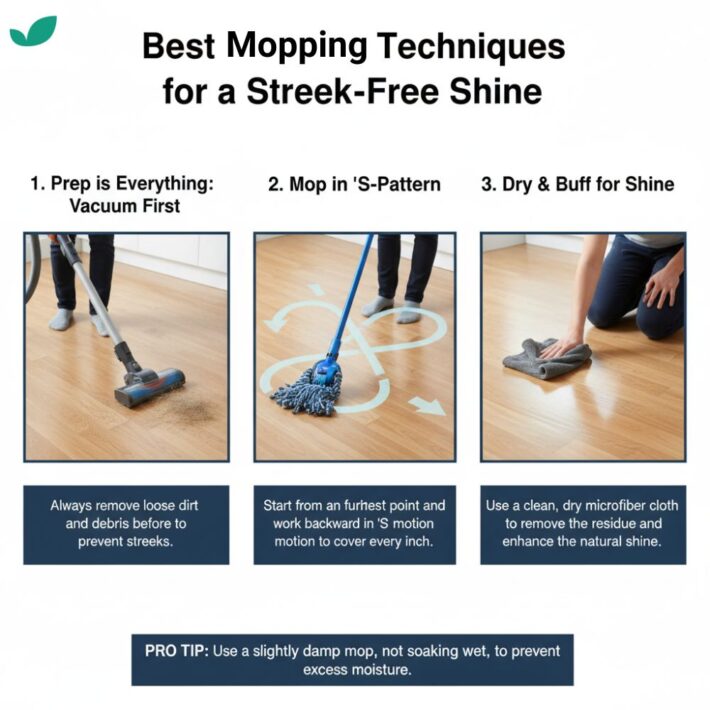
Best Mopping Techniques for a Streak-Free Shine
Knowing which homemade floor cleaner to use is only half the battle. Your mopping technique is what will truly give you a streak-free, professional-level clean.
- Prep is Everything: I can’t stress this enough: always start by vacuuming or sweeping your floors to remove loose dirt, dust, and debris. This step alone makes a huge difference in the final result.
- Mopping Methods: I typically use the “spray bottle” method for spot cleaning or for hardwood and laminate floors. This prevents you from oversaturating the floor. For larger jobs or tile floors, I’ll use the “bucket” method.
- Pro Tips for a Flawless Finish:
- Always use the “S-pattern” with your mop strokes, starting from the point furthest away from the door and working your way backward. This ensures you cover every inch without stepping on your freshly cleaned floor.
- I’ve seen so many people worry about a small amount of soap on the floor. I’ve found that if a dish detergent is safe for washing the dishes my family eats off of, a tiny residue on the floor is harmless.
- After mopping, I always go back and buff the floor with a clean, dry microfiber cloth. This final step removes any last bits of residue and gives you that perfect, streak-free finish.
Tools & Essentials for DIY Floor Cleaning
You don’t need a lot of fancy equipment to make your homemade floor cleaner dreams a reality. Here are the tools I rely on:
- A reliable bucket: Essential for mixing and holding your solution.
- A good spray bottle: Perfect for the “spray bottle” mopping method and for easy storage of your homemade floor cleaning solution.
- Measuring cups: Precision is key to getting the right consistency.
- A high-quality mop: I highly recommend using a mop with premium microfiber mop pads that you can wash and reuse. This not only saves money but also ensures you’re not just spreading dirt around.
Frequently Asked Questions (FAQs)
Is a DIY floor cleaning solution effective?
Yes! With the right ingredients and ratios, a DIY floor cleaning solution is just as effective as many store-bought options, without the added chemicals and cost.
Is a diy wood floor cleaner, castile soap safe?
No, I don’t recommend using Castile soap for wood floors. As I mentioned, it can leave a residue that builds up over time and dulls the finish, unlike a gentle detergent.
What is a good 5-minute homemade floor cleaner recipe?
For a quick, all-purpose solution, you can’t go wrong with my all-purpose recipe from the list above. It takes less than five minutes to mix up and is perfect for daily messes.
How often should I clean my floors?
I recommend mopping high-traffic areas like kitchens and hallways once a week. Bedrooms and other less-used spaces can be cleaned less frequently.
How do I make my floor stop feeling sticky after mopping?
The most common culprits are using too much soap, using the wrong type of soap (like Castile), or not rinsing properly. I’ve found that using the recipes with alcohol for a streak-free finish will prevent stickiness.
Should I keep mopping until the water runs clear?
Not necessarily. If you’ve vacuumed or swept well beforehand, your mop water shouldn’t be too dirty. It’s more important to use the correct technique and cleaning solution.
Should I ask my landlord what to use?
This is a great idea, especially if you’re in a rental with an older floor. They’ll know the type of finish and can recommend products to ensure you don’t accidentally damage their property.
Conclusion
Creating your own homemade floor cleaner is one of the easiest and most rewarding DIY projects you can tackle. Not only will you save money and reduce waste, but you’ll also have the peace of mind that comes with knowing exactly what’s in your cleaning products. I’ve found that my floors stay cleaner for longer, and the fresh scent of essential oils makes my apartment feel like a sanctuary after a long day in the city. Now that you have these tried-and-true recipes, you can enjoy sparkling, residue-free floors, too.
What’s your biggest floor cleaning challenge? Let me know in the comments below!





